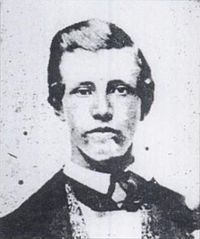- Charles H. Marsh
-
Charles H. Marsh 
Charles H. MarshBorn 1840
Milford, ConnecticutDied January 25, 1867 (aged 26–27)
Pawling, New YorkPlace of burial Quaker Cemetery, New Milford, Connecticut Allegiance United States Service/branch United States Army Years of service From 1861 Rank Corporal Unit 1st Connecticut Cavalry Battles/wars American Civil War
• Valley Campaigns of 1864
• Battle of Spotsylvania Court HouseAwards Medal of Honor Charles H. Marsh (1840 – January 25, 1867) was a Union Army soldier in the American Civil War and a recipient of the United States military's highest decoration, the Medal of Honor, for his actions during a skirmish in the Valley Campaigns of 1864.
Biography
Born in Milford, Connecticut in 1840, Marsh was raised in the Lanesville district of New Milford.[1][2] He enlisted in the Army from New Milford on October 21, 1861, and served as a private in Company D of the 1st Connecticut Cavalry.[2][3]
In October 1862, one year after his enlistment, Marsh was captured by Confederates near Haymarket, Virginia. He was found with a letter which indicated to the Confederates that he may be a spy, and he was jailed at Castle Thunder, a facility in Richmond for civilian prisoners and Union agents. Marsh protested to Confederate Secretary of War James Seddon, arguing that the area where he was captured was Union-held, and he should thus be considered a prisoner of war rather than a spy. His argument was rejected, but he was nevertheless released in a prisoner exchange in December of that year.[1]
Marsh rejoined the 1st Connecticut Cavalry and participated in the Valley Campaigns of 1864. On July 31, 1864, in the Back Creek valley of western Virginia, his unit conducted a raid on Confederate General Jubal Early's troops. During the skirmish, Marsh captured a color bearer and his flag.[1] For these actions, he was awarded the Medal of Honor six months later, on January 23, 1865. His official citation reads "Capture of flag and its bearer."[3]
Marsh took part in the Battle of Spotsylvania Court House of May 1864 and reached the rank of corporal before leaving the military.[1][4] He moved to Pawling, New York, where he died at age 27 of tuberculosis, which he had contracted in the Army.[1][2] He was buried at Quaker Cemetery in New Milford.[4]
Marsh Bridge, spanning the Housatonic River in New Milford, is named in his honor.[2] He is one of only two Milford residents to have received the Medal of Honor, the other being Indian Wars officer George W. Baird.[1]
See also
- List of Medal of Honor recipients
- List of American Civil War Medal of Honor recipients: M–P
References
- ^ a b c d e f Juliano, Frank (May 30, 2010). "Civil War Medal of Honor winner had ties to Milford". Connecticut Post (Bridgeport, Connecticut). Archived from the original on May 31, 2010. http://www.webcitation.org/5q9Hh7og6.
- ^ a b c d Smith, Frances L. (2000). Images of America: New Milford. Charleston, South Carolina: Arcadia Publishing. p. 118. ISBN 9780738504506. http://books.google.com/books?id=wNDatUi4hUoC&pg=PA118&dq=charles+marsh.
- ^ a b "Civil War Medal of Honor recipients (A–L)". Medal of Honor citations. United States Army Center of Military History. August 3, 2009. http://www.history.army.mil/html/moh/civwarmz.html. Retrieved May 31, 2010.
- ^ a b "Charles H. Marsh (1840 - 1867)". Find a Grave. September 5, 2003. http://www.findagrave.com/cgi-bin/fg.cgi?page=gr&GRid=7836724. Retrieved May 31, 2010.
Categories:- 1840 births
- 1867 deaths
- People from New Haven County, Connecticut
- People from New Milford, Connecticut
- Union Army soldiers
- Army Medal of Honor recipients
- Deaths from tuberculosis
- Infectious disease deaths in New York
Wikimedia Foundation. 2010.
